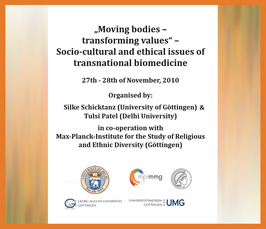" 'Moving bodies – transforming values' – Socio-cultural and ethical issues of transnational biomedicine"
Workshops, conferences 2010
- Start: Nov 27, 2010 09:00 AM (Local Time Germany)
- End: Nov 28, 2010 04:00 PM
- Location: MPI-MMG, Hermann-Föge-Weg 11, Göttingen
- Room: Library Hall

For more details please contact esser(at)mmg.mpg.de.
- by invitation only -
Biomedicine and the related bioethical problems were only associated with highly industrialised, Western health care systems for a long time. Today, most non-Western or developing countries also face the implemen-tation of biomedicine on different levels – and the rise of cutural, social and ethical questions.
The workshop aims at analysing the relationship between local and global biomedical practices from a social and an ethical point of view. The connectedness and mutual dependence of cultural variety, national legal and economic frameworks and, additionally, public trust in and responsibility of the medical profession can best be highlighted and examined by a cross-cultural comparison. For this purpose, the juxtaposition of India and Germany provides an ideal setting. While in both countries, biomedical research and practise are well established, they differ in the cultural framing with regard to factors such as medical tradition, religion/secularity and gender as well as in the socio-economical background.
Within this field, special attention should be drawn to the gender dimension in biomedicine and health issues. Medical tourism, mobility of body and body parts, giving birth, ageing and health care will be discussed.
A closed workshop with sufficient time for discussion and interdisciplinary exchange is scheduled to ensure an intensive dialogue between the different disciplines.